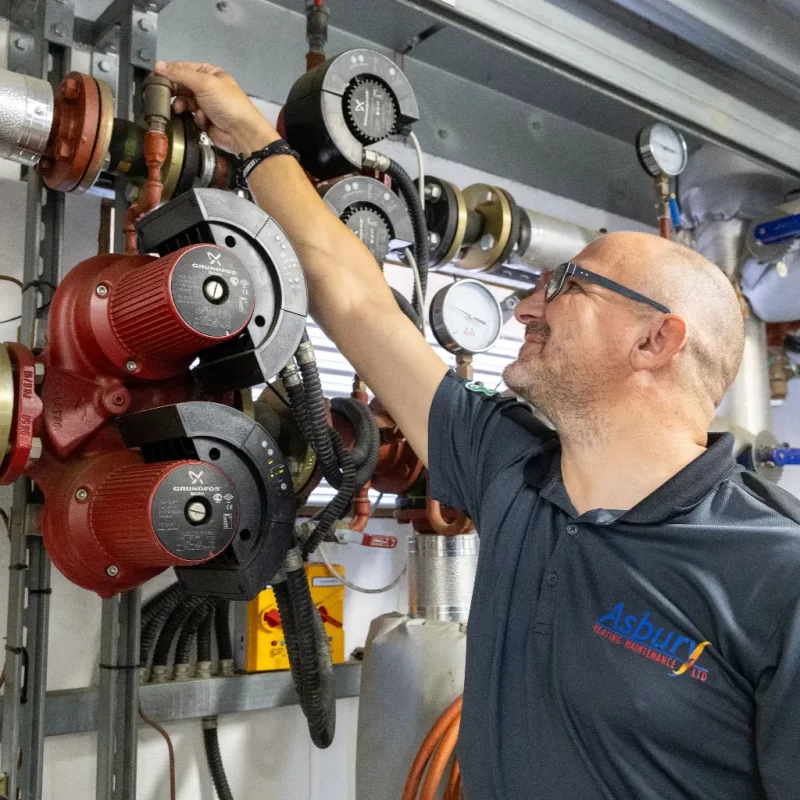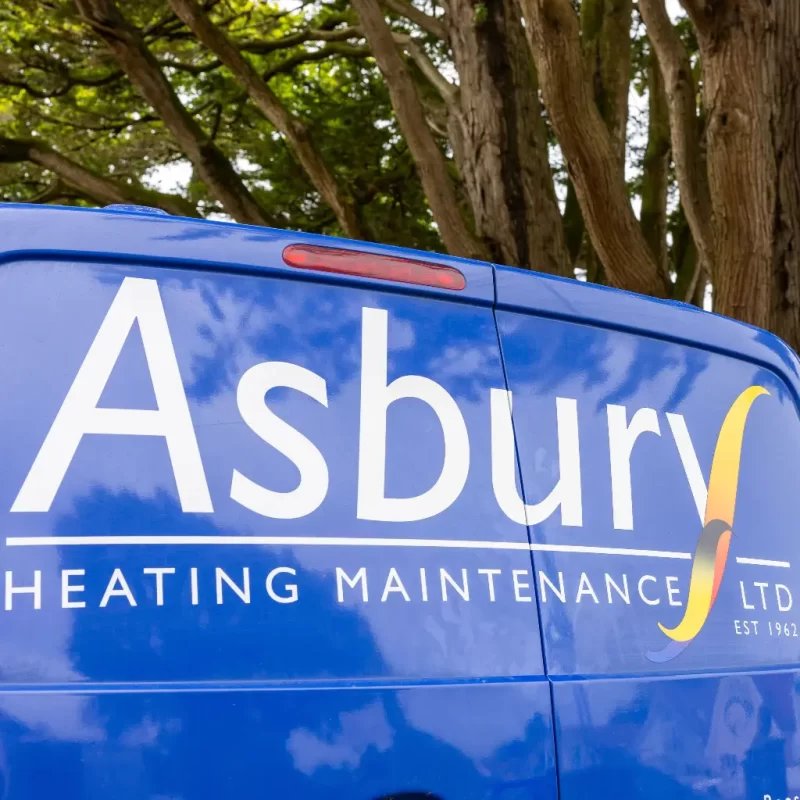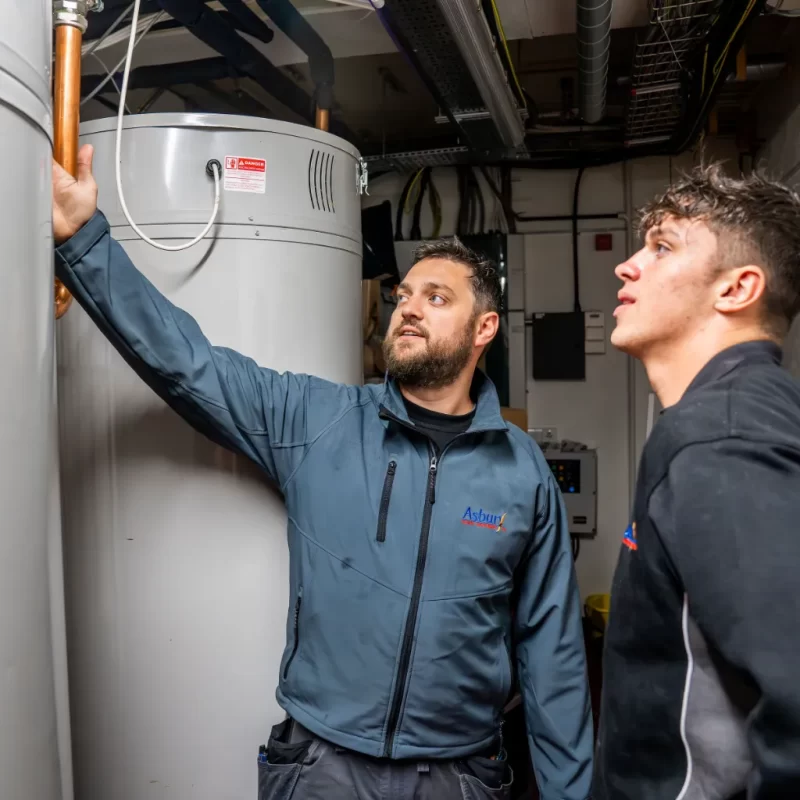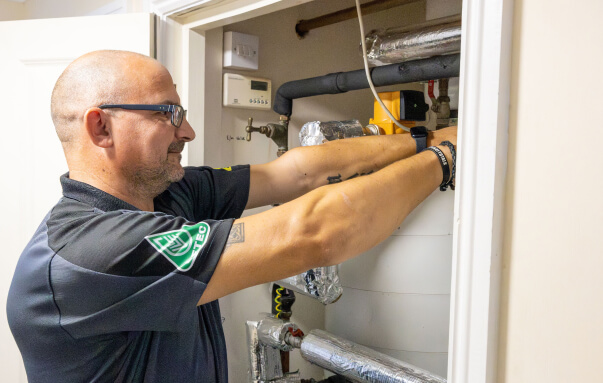
What Do Commercial Boiler Energy Efficiency Ratings Mean?
Commercial boiler energy efficiency ratings show how effectively a boiler turns fuel into usable heat. Naturally, this process directly affects running costs, emissions and long-term budget planning. For facility managers and property teams, these ratings provide a clear way to compare ageing plant with modern, higher efficiency equipment. Plus, it’s the best way to decide when maintenance or replacement work should move up the agenda.
In the UK, building performance is shown on an Energy Performance Certificate (EPC) [1]. This certificate rates efficiency from A to G, with A being the most efficient and G the least efficient. These ratings reflect a building’s energy efficiency and the likely cost of heating and lighting.
This article explains how commercial boiler energy efficiency ratings are assessed, what they indicate in real operating conditions and how they can guide future heating decisions with greater confidence.
How to Read Commercial Boiler Efficiency Labels
When you check the efficiency details for a commercial boiler, you will usually see a percentage figure and, sometimes, an A-G rating. A higher percentage means more of the fuel is turned into usable heat. Modern condensing boilers can achieve much higher efficiencies than older non-condensing systems when correctly specified, installed, and maintained.
As a broad guide, boiler ratings are often grouped into bands that look similar to this:
A | (90%+)
Typically modern condensing boilers with high efficiency and lower running costs. New gas boilers installed in England are generally expected to achieve around 92% seasonal efficiency.
B | (86 to 90%)
Still efficient in day-to-day use, often earlier condensing models that remain in good condition.
C | (82 to 86%)
Mid-range performance. These boilers are usually older but can still deliver reliable heat when well-maintained.
D | (78 to 82%)
Noticeably less efficient. Units in this band are often older, non-condensing boilers that would not meet current expectations for new installations.
E | (74 to 78%)
Inefficient by modern standards. These systems tend to use more fuel to achieve the same heat output and are strong candidates for replacement planning.
F | (70 to 74%)
Very inefficient. These are usually legacy non-condensing boilers that waste significant fuel and may be approaching the end of their life.
G | (70%-)
Very poor performance. Equipment in this band typically offers limited value in commercial settings and is often prioritised for upgrade.
It is important to understand how these figures are calculated. Seasonal efficiency reflects performance over a typical year rather than under fixed test conditions. For commercial buildings, where heat demand varies across zones and times of day, seasonal efficiency provides a more realistic indication of how the boiler will perform once installed and integrated with your controls.
When you compare options, focus on like-for-like ratings that match your building’s:
- Fuel type
- Output range
- Pattern of use
If you are planning a new boiler room or replacing ageing plant, hire our Commercial Boiler Installation service. Our experienced engineers can match new systems to your building’s actual heat demand and control strategy.
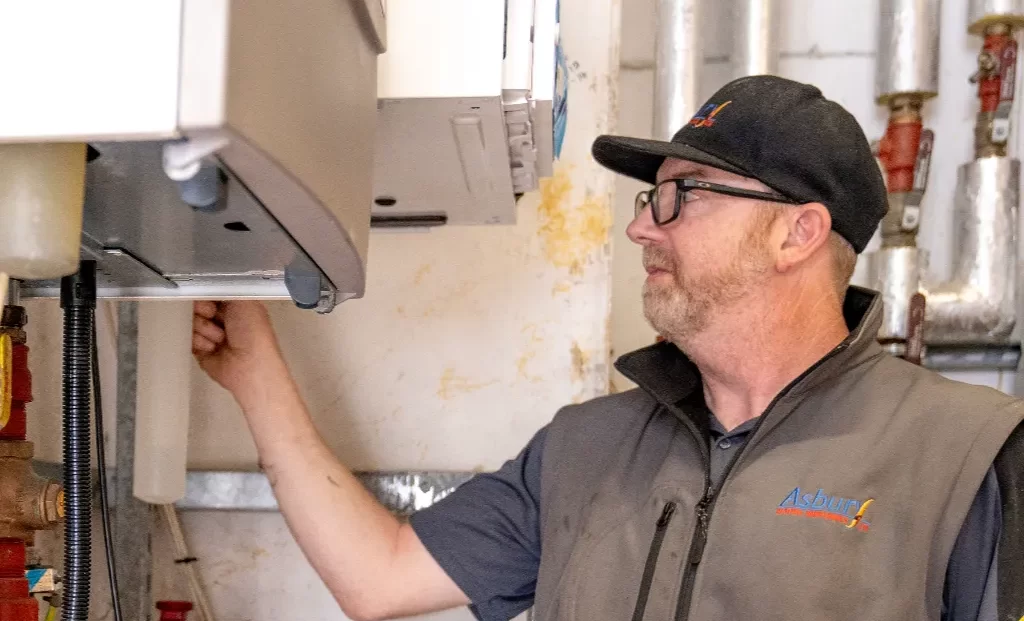
What Commercial Boiler Energy Efficiency Ratings Show & Why They Matter
Commercial boiler energy efficiency ratings show how much of the gas or oil a system uses is converted into usable heat. Higher-rated boilers waste less energy through the flue, so more of what you pay for heats your building. Modern condensing boilers recover heat from exhaust gases, making them more efficient than older non-condensing models. The Energy Saving Trust [2] explains that condensing boilers achieve higher efficiencies by capturing heat that would otherwise escape in the flue.
Most ratings reflect three practical factors:
- How completely the boiler burns its fuel
- How effectively the system recovers heat through condensing technology
- How closely the controls match output to real demand
Because heating and hot water are often among the largest controllable energy costs in a commercial property, even small efficiency gains can support tighter budget control. UK government guidance on Energy Efficiency for Businesses [3] confirms that improving efficiency can cut bills and reduce environmental impact.
For estates and facilities teams, commercial boiler energy-efficiency ratings serve as a planning tool. They highlight when an older plant is likely to be driving up costs, when an upgrade could support better EPC outcomes, and how heating performance fits into wider sustainability and asset management plans.
Using Efficiency Ratings to Choose the Right Commercial Boiler
Efficiency ratings help you understand how well a commercial boiler will perform once installed and in daily operation. The right choice depends on your building’s size, occupancy pattern and heating requirements. A school or care home that operates for long hours will have very different demands from an office with defined peak times.
Higher-efficiency models can offer better long-term value because they use less fuel to maintain stable temperatures. When planned with good controls, zoning and a well-balanced system, an efficient boiler can support predictable energy use across your site. This gives estates teams clearer insight into lifecycle costs and replacement planning.
If you are exploring replacement work, it can help to look at proven examples. Our Case Studies show how commercial clients across education, healthcare, and business settings have upgraded legacy equipment to more efficient systems.


Professional Boiler Maintenance Protects Efficiency
A professional assessment is one of the most reliable ways to understand how efficiently your commercial boiler is running. An experienced engineer can review combustion performance, flue gas readings, system balance and control settings to show how closely the system is operating to its intended efficiency and whether adjustments are needed.
- Regular servicing helps maintain performance throughout the year. Components can drift from their optimal settings over time, increasing fuel consumption and reducing reliability. Our Commercial Boiler Servicing team conducts routine checks to ensure steady heating performance across busy sites.
- Planned Boiler Maintenance Contracts keep plant rooms compliant and reduce the risk of unexpected issues. They also give estate teams clearer control over budgets and long-term planning.
- Combustion testing and purging confirm that systems operate safely during installations or changes to key components. Our Commercial Testing and Purging services set out how these checks support safe operation.
- Carbon monoxide safety is also a critical part of boiler room management. Our team provides guidance on Carbon Monoxide Prevention & Detector Installations.
Together, these services help protect boiler efficiency, support compliance, and give facilities and estates teams greater confidence in the performance and safety of their plant rooms.
Get Expert Support to Improve Your Boiler Efficiency
Commercial boiler energy efficiency ratings give facility managers and property teams a clear way to understand how well the heating plant is performing and what that means for fuel use, comfort and long-term compliance. These ratings help you compare older systems with modern, higher-efficiency options and support planning when energy costs or regulatory expectations change.
For buildings that depend on consistent heat over long operating hours, this level of insight makes day-to-day management more predictable. If you are reviewing your current boiler, preparing for future upgrades or looking to improve efficiency across your estate, Asbury Heating can help. Their engineers have supported commercial clients for more than 60 years and work with buildings throughout Dorset, Hampshire and Wiltshire.
Call 01202 745189 or arrange a consultation about improving your boiler efficiency.
External Sources
[1] Energy Performance Certificate (EPC): https://www.gov.uk/energy-performance-certificate-commercial-property
[2] Energy Saving Trust: https://energysavingtrust.org.uk/advice/boilers/
[3] GOV ”Energy Efficiency for Business”: https://businessenergyefficiency.campaign.gov.uk/


